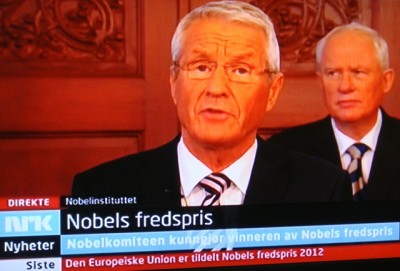Reaction to the Norwegian Nobel Committee’s decision to award this year’s Peace Prize to the EU was predictably mixed, but one man is very pleased indeed. Not only could committee chairman Thorbjørn Jagland finally initiate acclaim for the EU, the prize also may help him silence a long list of critics.

“Absurd,” “worthy,” “honourable” and “a mistake” were among the various characterizations attached to the prize to the EU after it was announced on Friday. The prize set off immediate debate in Norway, where Jagland was viewed as chiding the Norwegian people for having refused to join the EU themselves.
The powerful anti-EU lobby in Norway, along with anti-EU members of Norway’s left-center coalition government, were very unhappy that the EU had won the Nobel Peace Prize. Despite all the criticism and controversy it often generates, it’s still widely viewed as the most prestigious prize in the world. The leader of the EU Commission, Jose Manuel Barroso, called the prize “a great honour” and an “inspiration” for all Europeans.
The Nobel Committee and, most recently, Jagland himself have been criticized for years over their choices of Peace Prize winners. They’ve been accused of failing to adhere to the terms of prize benefactor Alfred Nobel’s will, of awarding “political prizes” that allegedly serve Norway’s own political agenda, of meddling in the internal affairs of other countries or of promoting personal causes with whom the Nobel Committee agrees.
Most of all, critics have raged that the Nobel Peace Prize isn’t always awarded to people or organizations who have much to do with peace, and instead has evolved into prize that instead mostly champions human rights.
Jagland and many Nobel Committee leaders before him have connected human rights with peace, so that criticism doesn’t bother them. But Jagland and others at the Norwegian Nobel Institute have been stung by criticism that questions the independence of the committee, whether the committee adheres to the terms of Alfred Nobel’swill, or claims that the committee simply carries out the political agenda of the Norwegian government. Such criticism, unwarranted in Jagland’s view and Norwegian officials at both ends of the political spectrum, rose to the surface especially after the committee awarded the Nobel Peace Prize to jailed Chinese dissident Liu Xiaobo in 2010. China froze relations with Norway and still blames the Norwegian government for defying and embarrassing them, even though the government itself played no role in the prize to Liu.
By awarding the Peace Prize to the EU, the committee can prove the Norwegian government had nothing to do with that decision either. No Norwegian government, certainly not the current left-center coalition that’s deeply divided on EU issues, would even suggest a prize to the EU, much less make one. While Prime Minister Jens Stoltenberg gave his customary congratulations to the winner as he always does, Audun Lysbakken, head of the Socialist Left party (SV) that’s part of Stoltenberg’s coalition, quickly called the prize “a mistake.” He told Norwegian Broadcasting (NRK) that it was “a political statement” in the EU debate and that events of the past year in the crisis-hit EU don’t warrant the prize.
Beyond the local controversy within Norway over the prize, Jagland also directly addressed critics who claim that Nobel committees over the years have ignored the terms of Alfred Nobel’s will. This prize in particular, Jagland stressed, recognizes the EU for promoting the “fraternity between nations” that Nobel explicitly demanded. Few can argue that the EU has maintained peace among member nations on a continent that experienced two horrific wars in the last century. The EU has kept the peace for six decades, and inclusion of nations in Balkans further enforces the reconciliation that Nobel also espoused.
The prize to the EU also relieves Jagland and his committee colleagues of criticism from cultivating any specific individuals, akin to what erupted after their prize to US President Barack Obama in 2009. And it gives them a chance to offer just the sort of inspiration that Barroso referred to, in the hopes of holding the EU together and prevent European countries from reverting to armed conflicts with one another.
“I hope discussion will focus on the core of this award, that the EU has contributed towards peace for more than 60 years,” Jagland told NRK after announcing the prize. He called the local debate over EU membership in Norway “completely legitimate,” but added “that’s not what the committee’s prize is about, and not what’s most important right now.”
Views and News from Norway/Nina Berglund
Please support our news service. Readers in Norway can use our donor account. Our international readers can click on our “Donate” button:

